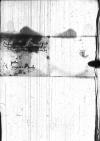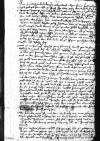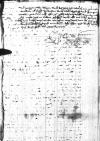Ewer Gnaden cf. Ioannes DANTISCUS to Ulrich EHINGER 1534-12-18, CIDTC IDL 6961, letter lost;
Ioannes DANTISCUS to Ulrich EHINGER 1535-01-04, CIDTC IDL 6962, letter lost⌊cf. Ioannes DANTISCUS to Ulrich EHINGER 1534-12-18, CIDTC IDL 6961, letter lost;
Ioannes DANTISCUS to Ulrich EHINGER 1535-01-04, CIDTC IDL 6962, letter lost⌋, der dattum XVIII Decembris und 4 Janner, sein mir vergangenen tag wol zu kommen, daraus ich Ewer Gnaden gesundthait und benueglich leben mit sondren fróden vernommen hab. Gott der herr well Ewer Gnaden söllchs lange zeit mit genaden bestetten, amenn. So haben factors of The FUGGERS ⌊der Fugger leutfactors of The FUGGERS ⌋ mir und Albrecht Cuon (Kohn) (†after 1559), a German merchant from Nuremberg, and the Welsers' factor in Spain (Oberdeutsche Kaufleute, p. 36, footnote 122)⌊Albrechten CounAlbrecht Cuon (Kohn) (†after 1559), a German merchant from Nuremberg, and the Welsers' factor in Spain (Oberdeutsche Kaufleute, p. 36, footnote 122)⌋ die XXXVIII ducaten, so wir der Isabel Delgada (†after 1546-06-15), Dantiscus' paramour during his stay in Spain, mother of his two children, Juana and Juan (Juan died in childhood)⌊Isabel DelgadaIsabel Delgada (†after 1546-06-15), Dantiscus' paramour during his stay in Spain, mother of his two children, Juana and Juan (Juan died in childhood)⌋ gelichen hetten, von Ewer Gnaden wegen zu Gdańsk (Danzig, Dantiscum), city in northern Poland, on the Bay of Gdańsk at the mouth of the Vistula, on the Baltic, the biggest and wealthiest of the three Great Prussian Cities (Gdańsk, Thorn (Toruń), and Elbing (Elbląg)) with representation in the Council of Royal Prussia; a member of the Hanseatic League⌊DanckeGdańsk (Danzig, Dantiscum), city in northern Poland, on the Bay of Gdańsk at the mouth of the Vistula, on the Baltic, the biggest and wealthiest of the three Great Prussian Cities (Gdańsk, Thorn (Toruń), and Elbing (Elbląg)) with representation in the Council of Royal Prussia; a member of the Hanseatic League⌋ wider entricht / und dieweil es mit gemelter Isabel die gestallt hat, / daz jecz der recht vatter herr Fabian (dem ich von Ewer Gnaden wegen alle freundtschafft erzaig) selbst hie / und sÿ / Ewer Gnaden erpottnen guthaith so undanckpar / ist, wollen wir uns ir weiter nit annemmen, sonder sÿ sampt dem Juana Dantisca (*1527 – †1601), daughter of Ioannes Dantiscus and Isabel Delgada; wife of Diego Gracián de Alderete (SKOLIMOWSKA 2004, p. 52; LLAMAS 1995; LLAMAS 1999; LLAMAS 2001; LLAMAS, SKOLIMOWSKA; MELGAR, 37, ...)⌊kindJuana Dantisca (*1527 – †1601), daughter of Ioannes Dantiscus and Isabel Delgada; wife of Diego Gracián de Alderete (SKOLIMOWSKA 2004, p. 52; LLAMAS 1995; LLAMAS 1999; LLAMAS 2001; LLAMAS, SKOLIMOWSKA; MELGAR, 37, ...)⌋ / laut Ewer Gnaden schreiben gemelten irem rechten vatter also befolchen haben.
Ewer Gnaden newzeitungen sag ich gancz fruntlichen danckh. Gott der herr verleÿch sein gnad sich die allso all verfolgen mit der warhait, dann es alles gut zeitonge sein fur gemaine cristenhait und wiewol an der zeitong von Rhodes (Rodos), island in the Aegean Sea, 1522-12 - 1912 belonged to the Ottoman Empire⌊RodisRhodes (Rodos), island in the Aegean Sea, 1522-12 - 1912 belonged to the Ottoman Empire⌋ nischt, / so ist doch zuverhoffen, werden gar pald war werden, dann wir sonder zweÿffel achten, ir Charles V of Habsburg (*1500 – †1558), ruler of the Burgundian territories (1506-1555), King of Spain as Charles I (1516-1556), King of Naples and Sicily, King of the Romans (1519-1530), Holy Roman Emperor of the German Nation (elected 1519, crowned 1530, abdicated 1556); son of Philip I the Handsome and Joanna the Mad of Castile⌊maiestetCharles V of Habsburg (*1500 – †1558), ruler of the Burgundian territories (1506-1555), King of Spain as Charles I (1516-1556), King of Naples and Sicily, King of the Romans (1519-1530), Holy Roman Emperor of the German Nation (elected 1519, crowned 1530, abdicated 1556); son of Philip I the Handsome and Joanna the Mad of Castile⌋ durch die genad Gotts / und mit der gewaltigen rustong und armade sich nit allein Rodis, / sonder gancz Africa, the continent⌊AffricaAfrica, the continent⌋ und Constantinople (Istanbul, Constantinopolis), city and capital of the Ottoman Empire, today in western Turkey⌊ConstantinopelConstantinople (Istanbul, Constantinopolis), city and capital of the Ottoman Empire, today in western Turkey⌋, auch Greece⌊GreciaGreece⌋ zeerobern understen wird. Denmach ware zeitong forhanden ist, / daz der The Ottoman Turks (Turcae) ⌊TurgkThe Ottoman Turks (Turcae) ⌋ vom Tahmāsp I Safavid (Sophi) (*1514 – †1576), 1524-1576 Shah of Persia, 2nd. Shah of the Safavid dynasty, ruled 1524 - 1576. Son and successor of Ismail I Safavid ⌊SophiTahmāsp I Safavid (Sophi) (*1514 – †1576), 1524-1576 Shah of Persia, 2nd. Shah of the Safavid dynasty, ruled 1524 - 1576. Son and successor of Ismail I Safavid ⌋ ganncz uberwunden und vertriben ist.
Aus den America, the continent⌊IndiasAmerica, the continent⌋ kommen je lenger, je grósser zeitongen und unnamhafte grosse reichtumb. / Sein zu Seville (Sevilla, Hispalis, Sivillia), city in southwestern Spain, Andalusia, on the Guadalquivir river⌊SibillaSeville (Sevilla, Hispalis, Sivillia), city in southwestern Spain, Andalusia, on the Guadalquivir river⌋ erst vor 2 monaten 4 schiff ankommen, die ob 1500m ducaten in gold und silber pracht haben, davon Charles V of Habsburg (*1500 – †1558), ruler of the Burgundian territories (1506-1555), King of Spain as Charles I (1516-1556), King of Naples and Sicily, King of the Romans (1519-1530), Holy Roman Emperor of the German Nation (elected 1519, crowned 1530, abdicated 1556); son of Philip I the Handsome and Joanna the Mad of Castile⌊ir maiestetCharles V of Habsburg (*1500 – †1558), ruler of the Burgundian territories (1506-1555), King of Spain as Charles I (1516-1556), King of Naples and Sicily, King of the Romans (1519-1530), Holy Roman Emperor of the German Nation (elected 1519, crowned 1530, abdicated 1556); son of Philip I the Handsome and Joanna the Mad of Castile⌋ hat her pringen lassen, umb hier in probably Spain (Hispania)⌊Cronennprobably Spain (Hispania)⌋ zcumunczenn 300m ducaten schwer gold und silber, welches uff XXVIII dis monats Appril uff 21 trageslen wol her komen ist. So thut mann zu Seville (Sevilla, Hispalis, Sivillia), city in southwestern Spain, Andalusia, on the Guadalquivir river⌊SibillaSeville (Sevilla, Hispalis, Sivillia), city in southwestern Spain, Andalusia, on the Guadalquivir river⌋ auch anders nicht, dan minczen, von dar ir maiestet thail nach Flanders (Flandria), county in the Low Countries, part of the Habsburg Netherlands from 1482, today corresponding to the Belgian provinces of Western Flanders and Eastern Flanders, the region of Zeeuws-Vlaanderen in the Netherlands and part of the Département du Nord in France⌊FlanderFlanders (Flandria), county in the Low Countries, part of the Habsburg Netherlands from 1482, today corresponding to the Belgian provinces of Western Flanders and Eastern Flanders, the region of Zeeuws-Vlaanderen in the Netherlands and part of the Département du Nord in France⌋, Germany (Germania, Niemcy)⌊TeutschlandGermany (Germania, Niemcy)⌋ und Italy (Italia)⌊IttalliaItaly (Italia)⌋ verwexlet hatt, / also daz sÿ an allen orten zur nottorfft versehen / ist, / an nichten kain mangel, dan allain, daz u... Gott mit sein genaden beÿstand, so well wir, ob Gott will, allen feÿenden der cristenhait starkh genug sein.
Der Hernán Cortés de Monroy e Pizarro (*1485 – †1547), Spanish conquistador and Dantiscus' friend⌊Hernando CortesHernán Cortés de Monroy e Pizarro (*1485 – †1547), Spanish conquistador and Dantiscus' friend⌋ ist aus seim land auch mit ainer guten arma[de] weiter zedestubrieren auszogen in ain land, davon er von uber aus grosser reichtumb notticia haben soll. / Seÿen teglich, was er ausricht, von im zeitong gewertig, daz mag Ewer Gnaden hernach anzaigt werden.
Ich pin willens sampt meinemm lieben Ursula Meuting daugther of Lucas Meuting, member of the merchant family in Augsburg; from 1530 wife of Ulrich Ehinger (ZELINSKY HANSON, p. 123 and footnote 46; EIRICH, p. 170)⌊gemachelUrsula Meuting daugther of Lucas Meuting, member of the merchant family in Augsburg; from 1530 wife of Ulrich Ehinger (ZELINSKY HANSON, p. 123 and footnote 46; EIRICH, p. 170)⌋ Ewer Gnaden gefattherin sampt ainem new geporen son, / so uns Gott in Spain (Hispania)⌊disen landenSpain (Hispania)⌋ geben hat, / noch ain zeit in disen landen zu rue siczen, / pis ich sech was aus disen schwerenn und sorgklichen löffen werden well und pis die seckten und partheÿen der religion und des globen halb / durch ain gut cristelic[he] concillium oder sonst in unsern landen wider verglichen und verainigt wer[den]. Wollt Gott, wie auch Ewer Gnaden melden, daz wir unser wonung mit ... hug / nachet pey ain andren gehabenn und also ain annder die weil vertreiben móchten, / weÿl es aber nit gesein mag, / well wir die sach Got[te] demm herren befelchen / und ain andrenn dest óffter mit brieffen ersuchen.


